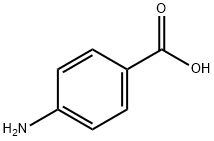A0640612
p-Anisidine , 99% , 104-94-9
Synonym(s):
4-Aminoanisole;4-Methoxyaniline;4-Methoxyaniline, 4-Aminoanisole, 4-Aminophenyl methyl ether;p-Anisidine
CAS NO.:104-94-9
Empirical Formula: C7H9NO
Molecular Weight: 123.15
MDL number: MFCD00007864
EINECS: 203-254-2
Update time: 2022-07-08
PRODUCT Properties
| Melting point: | 56-59 °C(lit.) |
| Boiling point: | 240-243 °C(lit.) |
| Density | 1.06 |
| bulk density | 700kg/m3 |
| vapor density | 4.28 |
| vapor pressure | 0.02 hPa (20 °C) |
| refractive index | 1.5559 |
| Flash point: | 122 °C |
| storage temp. | Store below +30°C. |
| solubility | 21g/l |
| pka | 5.34(at 25℃) |
| form | crystalline |
| color | dark gray to brown |
| Specific Gravity | 1.07 |
| PH | 7.7 (1g/l, H2O, 20℃) |
| Water Solubility | 21 g/L (20 ºC) |
| Merck | 14,667 |
| BRN | 471556 |
| Henry's Law Constant | (x 10-8 atm?m3/mol):
6.62 at 25 °C (thermodynamic method-GC/UV spectrophotometry, Altschuh et al., 1999) |
| Exposure limits | NIOSH REL: TWA 0.5 mg/m3, IDLH 50 mg/m3; OSHA PEL: TWA 0.5 mg/m3;
ACGIH TLV: TWA 0.1 ppm (adopted). |
| Dielectric constant | 8.8399999999999999 |
| Stability: | Hygroscopic, Material Darkens In Storage With No Loss In Purity |
| LogP | 0.950 |
| CAS DataBase Reference | 104-94-9(CAS DataBase Reference) |
| NIST Chemistry Reference | Benzenamine, 4-methoxy-(104-94-9) |
| IARC | 3 (Vol. 27, Sup 7) 1987 |
| EPA Substance Registry System | p-Anisidine (104-94-9) |
Description and Uses
p-Anisidine is used mostly for producing dyes, and some smaller quantities are employed in making pharmaceuticals and liquid crystals.
Safety
| Symbol(GHS) |    GHS06,GHS08,GHS09 |
| Signal word | Danger |
| Hazard statements | H300+H310+H330-H350-H373-H400 |
| Precautionary statements | P201-P202-P273-P280-P302+P352+P310-P304+P340+P310 |
| Hazard Codes | T+,N,Xi |
| Risk Statements | 45-26/27/28-33-50 |
| Safety Statements | 53-28-36/37-45-61-28A |
| RIDADR | UN 2811 6.1/PG 3 |
| OEB | C |
| OEL | TWA: 0.5 mg/m3 [skin] |
| WGK Germany | 2 |
| RTECS | BZ5450000 |
| F | 8 |
| Autoignition Temperature | 959 °F |
| TSCA | Yes |
| HazardClass | 6.1 |
| PackingGroup | III |
| HS Code | 29222200 |
| Hazardous Substances Data | 104-94-9(Hazardous Substances Data) |
| Toxicity | Acute oral LD50 for rats 1,400 mg/kg, mice 810 mg/kg, rabbits 2,900 mg/kg (quoted, RTECS, 1985). |
| IDLA | 50 mg/m3 |
| 発がん性評価について | IARC 3 |



